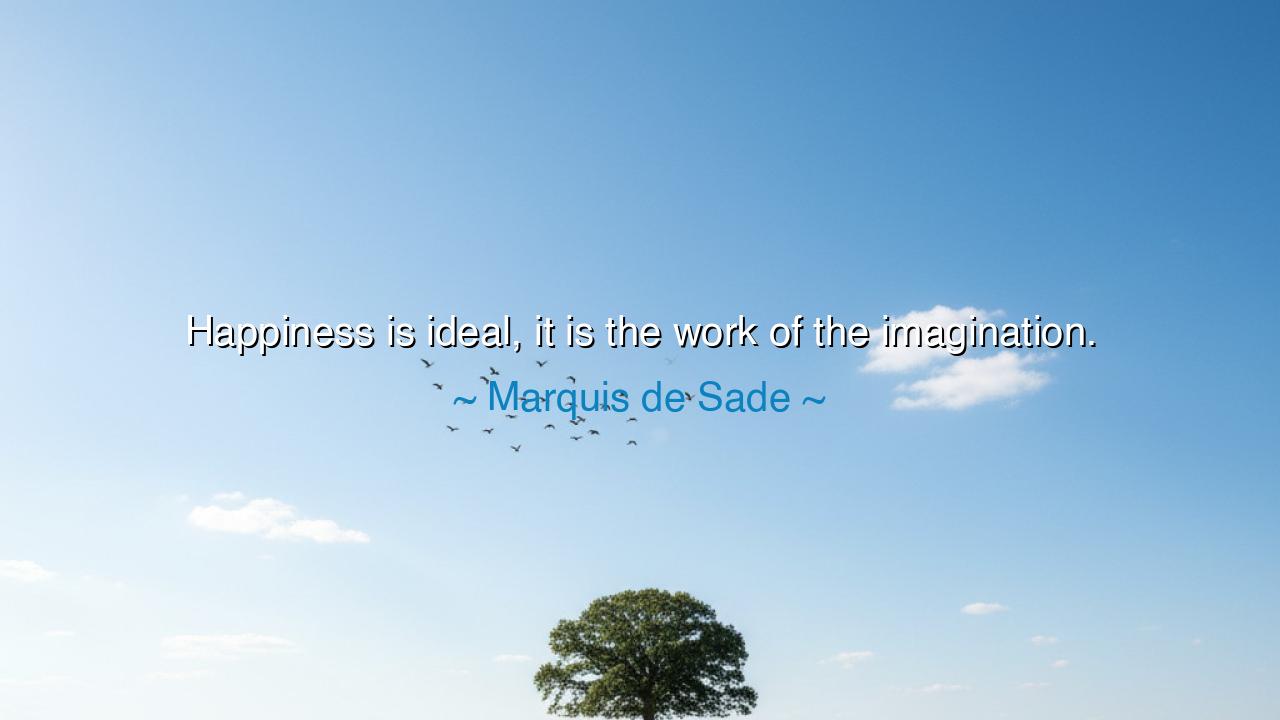
Happiness is ideal, it is the work of the imagination.






“Happiness is ideal, it is the work of the imagination.” So spoke Marquis de Sade, a man both cursed and celebrated, who saw in the depths of human nature what few dared to face. To understand his words is to walk upon the trembling bridge between reality and imagination, between the clay of the world and the flame that lives within the mind. Happiness, he tells us, is not found in the stones of cities nor in the embrace of wealth, but in the visions that rise from within—the invisible realm where thought gives birth to joy. The body can be caged, the world may turn against us, yet the imagination—ah, that divine spark—remains the sculptor of paradise.
De Sade wrote much of his philosophy from the dark confines of prison, where neither pleasure nor liberty graced his days. There, surrounded by silence and stone, he discovered a truth eternal: that happiness does not depend upon circumstance, but upon the mind’s power to create. Stripped of all earthly delight, he turned inward, finding in his imagination the freedom that the world had denied him. This, then, is the heart of his saying—that happiness is ideal, a form not of possession but of perception, an art of seeing the divine in what others would call despair.
Consider the story of Epictetus, the slave who became a philosopher. He was beaten, owned, and humiliated, yet he spoke calmly of serenity and reason. “You may fetter my leg,” he said, “but not my will.” Like de Sade, he understood that happiness springs from the inner kingdom—a realm ungoverned by fate. Though one was a libertine and the other a Stoic, both shared the same revelation: the imagination is the throne of the soul, and from it, all joy or sorrow descends.
The ancients knew this truth well. In the temples of Greece and the mountains of India, the wise taught that man creates his own heaven or hell. The Buddha renounced palaces and gold to find that enlightenment blooms not in the outer world but in the stillness of the heart. The Stoics called it ataraxia; the Hindus, ananda; de Sade called it imagination—different tongues speaking one eternal language. For imagination is not illusion; it is the power to shape meaning, to give light where darkness reigns.
Yet beware, my listener, for imagination can also deceive. It can paint false paradises, leading the soul into mirages of desire and pride. To make happiness the work of the imagination is not to escape reality, but to transform it—to see beauty where others see ruin, to find purpose in suffering, and to build from the ashes a temple of one’s own making. The wise do not flee from the world; they reimagine it with courage and grace.
Let us recall a humbler tale. There was once a craftsman who lost his sight but continued to carve wood by touch alone. “When I close my eyes,” he said, “I see with my heart.” In the darkness, his art grew finer, his spirit lighter. He imagined the curves of angels, the flow of rivers, and in his blindness found a joy that sight had never given him. His story echoes the teaching of de Sade: when the world withdraws its gifts, the imagination becomes the creator of new light.
So, what lesson shall we draw, we who wander between dream and duty? It is this: Happiness is not found—it is fashioned. The raw materials are thought, vision, and courage. To live well is to wield imagination not as escape, but as creation—to paint the dull canvas of existence with colors of one’s choosing. The world may bring storm, but the mind can bring sunrise.
And so, children of the coming age, remember: guard your imagination, for it is both sword and sanctuary. Feed it not with fear, but with wonder. When sorrow visits, let imagination carve meaning from pain. When joy fades, let it rekindle light from memory. Do not wait for happiness to come as a guest—it is the ideal that you yourself must summon. Imagine well, and you shall live like the gods, serene amid chaos, radiant amid ruin.






AAdministratorAdministrator
Welcome, honored guests. Please leave a comment, we will respond soon